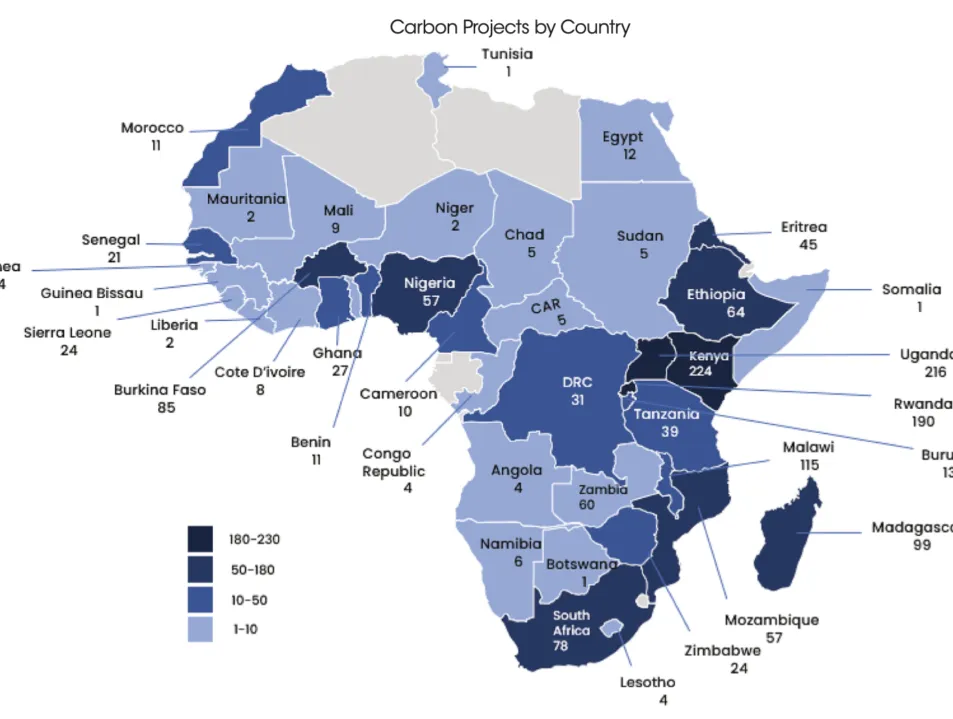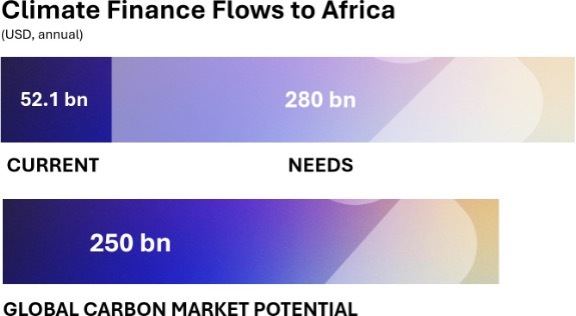Aug 26, 2025
CARBON MARKETS ARE CRITICAL TO BRIDGE AFRICA’S CLIMATE FINANCE GAP
Africa is one of the most vulnerable regions to climate change. At the same time, it sees vast opportunities for low-carbon development and green growth.

Currently, only $52 billion of climate finance flows to Africa on an annual basis – representing less than 20% of its needs. In order to implement countries current NDCs, the total investment need is estimated to be $2.8 trillion[1], indicating Africa’s climate finance flows must more than quadruple every year.[2]
Whilst private sector financing has doubled in recent years, it still represents only 18% of total flows, lower than any other region globally.[3] A key opportunity to bridge the gap is through ramping up the participation in international carbon markets.

The Potential of Carbon Markets
As outlined in a 2021 study co-led by IETA and the University of Maryland, carbon markets under Article 6 of the Paris Agreement could unlock more than $250bn annually by 2030, if all countries cooperate to achieve their NDCs.[4]
Voluntary Carbon Markets have mobilized over USD 5 billion for carbon mitigation globally in the last five years, and the potential for exponential growth is widely acknowledged by analysts and policy initiatives. While carbon revenues will not alone bridge the international climate finance, it may act as a key catalyst for further public and private sector financing of key low-carbon development activities across the region.
As recently outlined by the United Nations Economic Commission for Africa (UNECA), carbon markets present a unique opportunity for African countries to attract investment, adopt newer and cleaner technologies, and unlock sustainable economic development. [5]
However, as of 2023, Africa accounted for only 13.4% of all credits issued by the largest voluntary offset project registries.[6] In 2024, Africa’s carbon markets issued approx. 50 MtCO2e credits and approx. 25 MtCO2e was retired, far below the market’s potential and ambitions.[7]
To unlock the full scale of carbon financing, governments across Africa must play a critical role. It is also paramount to understand the demand landscape for high-integrity carbon credits and the role of authorisation under Article 6 of the Paris Agreement. With many countries currently preparing the submission of new NDCs ahead of COP30 in Belém, IETA developed a simple three-step model for a robust integration of Article 6 in the next wave of climate goals, which is available here.
Strengthened Efforts will be Necessary
Still, countries in Africa are at very different levels of readiness to participate in the carbon market. Whilst significant efforts are underway, further capacity building will be critical for countries to develop effective domestic policy frameworks, provide guidance regarding benefit-sharing and participation of local communities, establish the necessary infrastructure and authorisation processes, and ensure regulatory certainty for investors.
Some recent key initiatives include:
- The African Carbon Support Facility (ACSF) to be launched by the African Development Bank (AfDB) next year, aiming to support market infrastructure, de-risk supply generation for high-integrity carbon projects across the region, stimulate private sector investments and unlock international demand.[8]
- The African Union Development Agency (AUDA-NEPAD) carbon market package, which includes a Continental Coordinating Mechanism, a Digital Tracking Platform for Article 6 Readiness and new“African Integrity & Equity Principles for Carbon Markets” to be unveiled at the Africa Climate Summit 2.[9]
- The Carbon Market Activation Support Platform (CMAP), developed by the Africa Carbon Markets Initiative (ACMI), offers public data and analytics to build pipelines and track activity.[10]
- The Eastern and West African Alliances on Carbon Markets – which both serves the regional needs for policy alignment, capacity building and coordination. Earlier this year, IETA partnered with the two alliances on the organisation of the Eastern Africa Carbon Market Dialogue and the West Africa Carbon Market Hub.
Through our Business Partnership for Market Implementation (B-PMI), IETA is looking forward to continue strengthening our engagements with partners in the region.
Björn Fondén, International Policy Manager, and Leya Ally, Carbon Markets Programme Manager, will represent IETA at the UNFCCC Climate Week and Africa Climate Summit 2 in Addis Ababa, Ethiopia, from 3- 12 September. We look forward to meeting with partners on the ground to support the next era of Africa’s carbon markets.
To connect, please reach out to Björn fonden@ieta.org and Leya ally@ieta.org
[1] Climate Policy Initiative CPI (2022): The State of Climate Finance in Africa: Climate Finance Needs of African Countries
[2] Climate Policy Initiative CPI (2024): Landscape of Climate Finance in Africa 2024
[3] ibid.
[4] Edmonds, J., Yu, S., Mcjeon, H., Forrister, D., Aldy, J., Hultman, N., Cui, R., Waldhoff, S., Clarke, L., De Clara, S., & Munnings, C. (2021). How Much Could Article 6 Enhance Nationally Determined Contribution Ambition Toward Paris Agreement Goals Through Economic Efficiency? Climate Change Economics, 12(2), 1–18. https://www.jstor.org/stable/27130680
[5] Policy brief for African decision-makers: an overview of carbon markets as an effective policy tool for mitigating climate change, UNECA, 2024
[6] Africa Finance Corporation (2023) How Africa Can Unlock World’s Most Promising Net-Zero Solution
[7] Africa Carbon Markets Initiative ACMI (2025) Status and Outlook Report
[8] OneStop ESG (2025), Africa Carbon Support Facility Launched to Boost Climate Finance
[9] https://africanmediaagency.com/africa-unveils-landmark-integrity-equity-principles-and-coordination-platform-to-strengthen-carbon-markets/
[10] Carbon Market Activation Support Platform https://cmap.africacarbonmarkets.org/